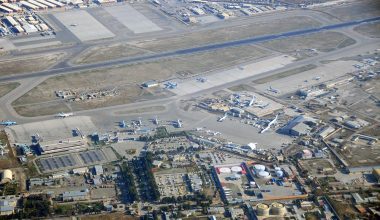Israel Aerospace Industries (IAI) has announced its deal with Etihad Engineering to establish a new conversion site in Abu Dhabi on Wednesday to facilitate the conversion of Boeing 777-300ER passenger jets into cargo planes (777-300ERSF). The new facility to be certified by UAE Civil Aviation Authority, the US Federal Aviation Administration, and the European Aviation Safety Agency will serve from the company’s maintenance center in hotspot Abu Dhabi International Airport. In a statement, Tony Douglas, Chief Executive of Etihad Aviation Group, told the aim behind this new conversion site to pent up the growing stipulation for freighters. According to him, the new site will be a more profitable, greener, and highly innovative solution for airline customers and propel the company’s business value.

Cargo operations have been the key element to recover the air demand making cargo yields a light spot as a result of the COVID pandemic. On the one hand, there is a suppression of passenger traffic due to travel restrictions around the world, and on the other hand, the airlines are still struggling to cover their fixed costs. While there aren’t enough aircraft to transport essential and time-sensitive materials in good time, the conversion of passenger aircraft into air freighters has increased.
At this new conversion site, the passenger aircraft will be converted for cargo use to cargo configuration. In addition to it, there will be overhaul services, repair, and maintenance services, along with staff training and guidance, assistance in acquiring certification and license, etc.
Israel’s normalization agreement with the United Arab Emirates was signed at the White House on September 15, 2020. The Abraham Accords have opened the door for IAI to expand its global activity to the UAE. Multiple deals have been made over the past years by Israeli companies in UAE. In March, IAI and UAE-based EDGE had signed an accord to jointly develop anti-drone to detect, identify and intercept drone and other UAV threats.
Also Read: Aviation fuel and types of aviation fuels with prices
The cargo conversion center in Abu Dhabi International Airport will expand its services to airlines in the Middle East and the wider region. Etihad Engineering will capitalize on its expertise and capabilities on Boeing 777-300ERSF Passenger-to-Freighter (P2F) conversion while expediting two conversion lines in the initial phase of this strategic partnership. The new Boeing cargo jet conversion site is claimed to be the largest and most advanced site in the Middle East.
The latest deal with UAE’s flag carrier, Etihad Airways, is a significant tier to the relation between Israel and the Gulf states, which will expand both parties’ services with cutting-edge technology and knowledge transfer. The capacity building will enable IAI and Etihad to expand cargo and logistic facilities in a time where demand for cargo aircraft has sharply risen as a result of e-commerce rise. This partnership with Etihad Engineering to provide P2F conversion on Boeing 777-300ERs is set to strengthen IAI’s foothold in the Gulf region and will lead to several deals with local firms in Gulf countries.
In 2019, IAI and GE Capital Aviation Services (GECAS) took their first step to cooperate on the conversion of the first Boeing 777-300ERSF. The $400 million projects has the envisioned goal of creating a cargo conversion aircraft. As the COVID-19 pandemic continues to take its toll on the aviation sector, developing a very efficient freighter can help meet current and future air cargo requirements. Last July, it also signed an agreement with Abu Dhabi-based Group 42 to collaborate on COVID-19 research intending to develop effective solutions to combat SARS-CoV-2.
About Israel Aerospace Industries
IAI is the nation’s largest aerospace and Defense Company and is one of the global technology leaders in the aerospace industry that unites all activity in human-powered aircraft. At present, state-owned IAI specializes in the conversion of Boeing 737,747 and 767 passenger aircraft. So conversion method for the Boeing 777 is being developed, with IAI’s target to finish the licensing process by 2023.
Israel Aerospace Industries is one of the leaders in conversion, well-known as a conversion center of the passenger to cargo aircraft. Both sides in this deal will increase cargo capacity in the fleet, ground service infrastructures and will benefit economically. IAI operates in diverse markets all around the world, providing services from India and Korea in the East through Brazil and Columbia in South America to Germany in Europe and UAE now. With the experience of almost 70 years in human capital, groundbreaking technologies, it has an attractive client base such as Amazon, DHL, Lockheed Martin, Boeing, Gulf Stream, etc.
Recently, IAI has also signed a deal with Ethiopian Airlines to make a new passenger-to-freighter conversion center in Ethiopia, which will commence with three Ethiopian Airlines-owned B-767-300 aircraft.
About Etihad Engineering
Etihad Engineering is one of the industry-leading aircraft maintenance and engineering solution providers in the Middle East and a part of Etihad Aviation Group. It specializes in providing total maintenance solutions for Airbus and Boeing aircraft. By utilizing state-of-art facilities, Etihad Airways Engineering adheres to world-class quality and safety standards, enhances the work packages, and reduces operating costs for the clients. It specializes in air services, engineering, aviation, aircraft maintenance, component repair, and technical training on its base at Abu Dhabi International Airport.

Boeing 777-300ERSF
Boeing 777-300ERSF has high quality and capabilities that attract customers and provide them with optimal solutions. The demand for the conversion of B777 aircraft is high as it is the first in its size category to deliver extensive solutions and long-term value making it a technological breakthrough. Boeing 777-300ERSF or the Big Twin is the most successful widebody type renowned for its capability and performance. Suited to today’s demand, it has great volume, less cost, great range, and commonality. This marmite has a twin-engine efficiency that burns 21% more fuel than the 747-400 freighter variant and has 25% more volume than 777-200F freighters. It is expected to enter the air service in 2022.

Passenger-to-freighter conversion
The P2F conversion involves changing the aircraft structure that will
- Install a new cargo door
- Replace and strengthen the aircraft floor
- Modify electrical systems to enable safe and convenient operations
- Install reinforcement near the cargo opening.
- Recent actions in air cargo operations
- Covering windows
- Adding a bulwark in front of the cockpit
- Installing a mechanical handing system for pallets
IAI is adding production capacity in anticipation of strong demand for the all used cargo jet experiencing growing e-commerce volumes. The conversion will allow consignments to be consolidated in containers.
Recent actions in air cargo operations
The recent actions in air cargo operations led by the COVID-19 pandemic are:
- Deploying the retired widebodies planes to the air by turning them into air cargo jets to meet the growing demand.
- Using passenger jet as a cargo aircraft by removing seats or putting cardboard boxes in the cabin.
- Designing and introducing air cargo containers to optimize cargo volume and minimize operating costs.
The gradually increasing passenger flight will soon result in leaving off the new passenger-freighter operators from the market.
The reason behind the booming of passenger-to-freighter conversion
The e-commerce boom has driven the booming of passenger-to-freighter conversion. As more and more people opt for online shopping and passenger skies remain deprived of air traffic, many airlines and leasing companies are now indulging in converting older passenger jets to air freighters, assisting aviation maintenance, repair, and overhaul groups.
While demand for time-critical and urgent cargo transportation has ratcheted up, the shortage of passengers has been a blessing in disguise for some airlines to turn the coronavirus crisis into an opportunity through the utilization of cargo aircraft in long-haul routes by decreasing ground time and postponing the repair and maintenance. High cargo demand in the COVID-lead airline industry caused by the absence of belly-hold capacity has elated swapping out passengers for cargo. The online shopping boom and global demand for vaccination and medical supplies have stimulated airlines to mark rehearsal of fortune for the sector on the heels of its worst years.






